Major Henry Charles David Marshall - Wallet 1 - Booklet 3 - Part 1
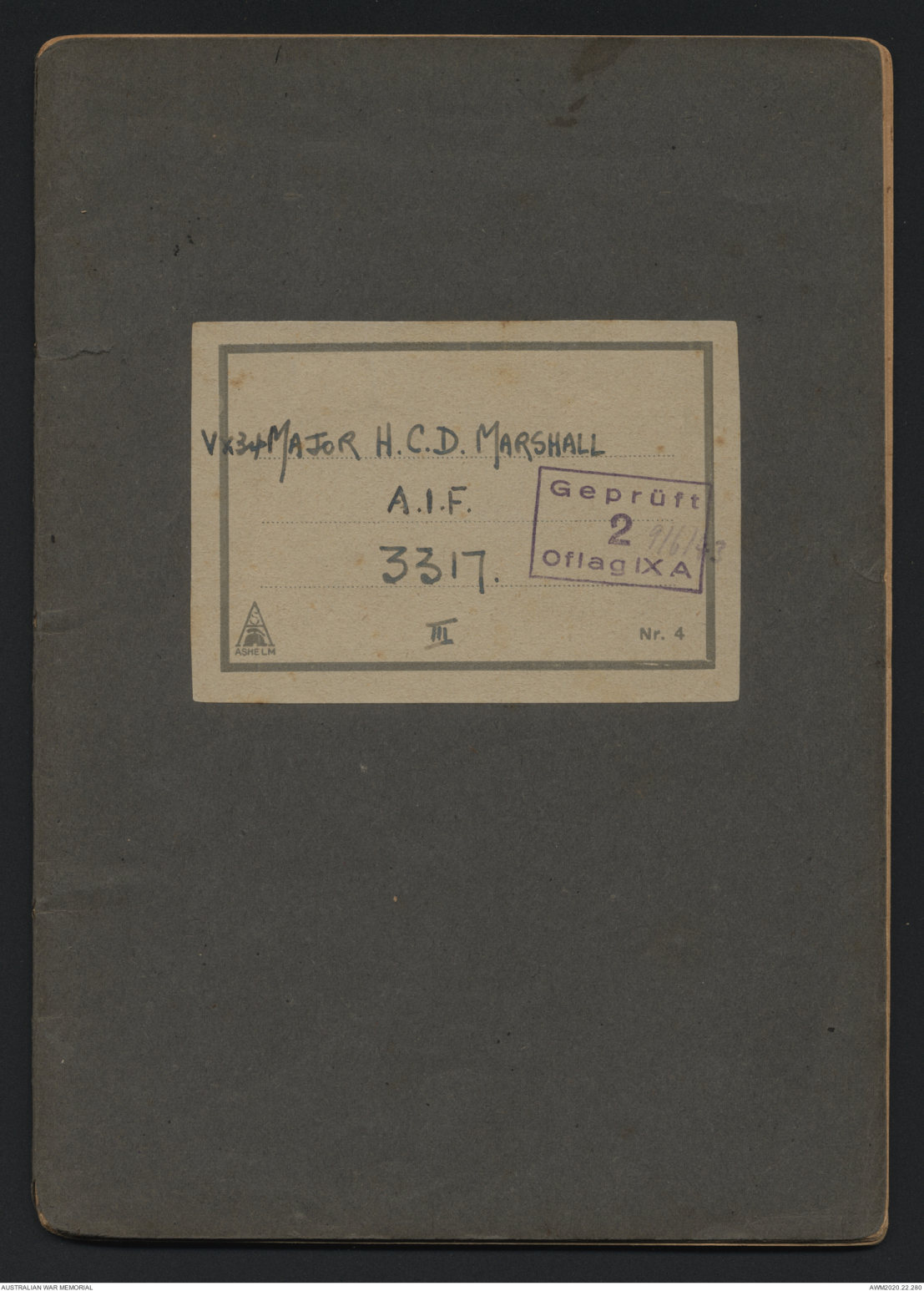
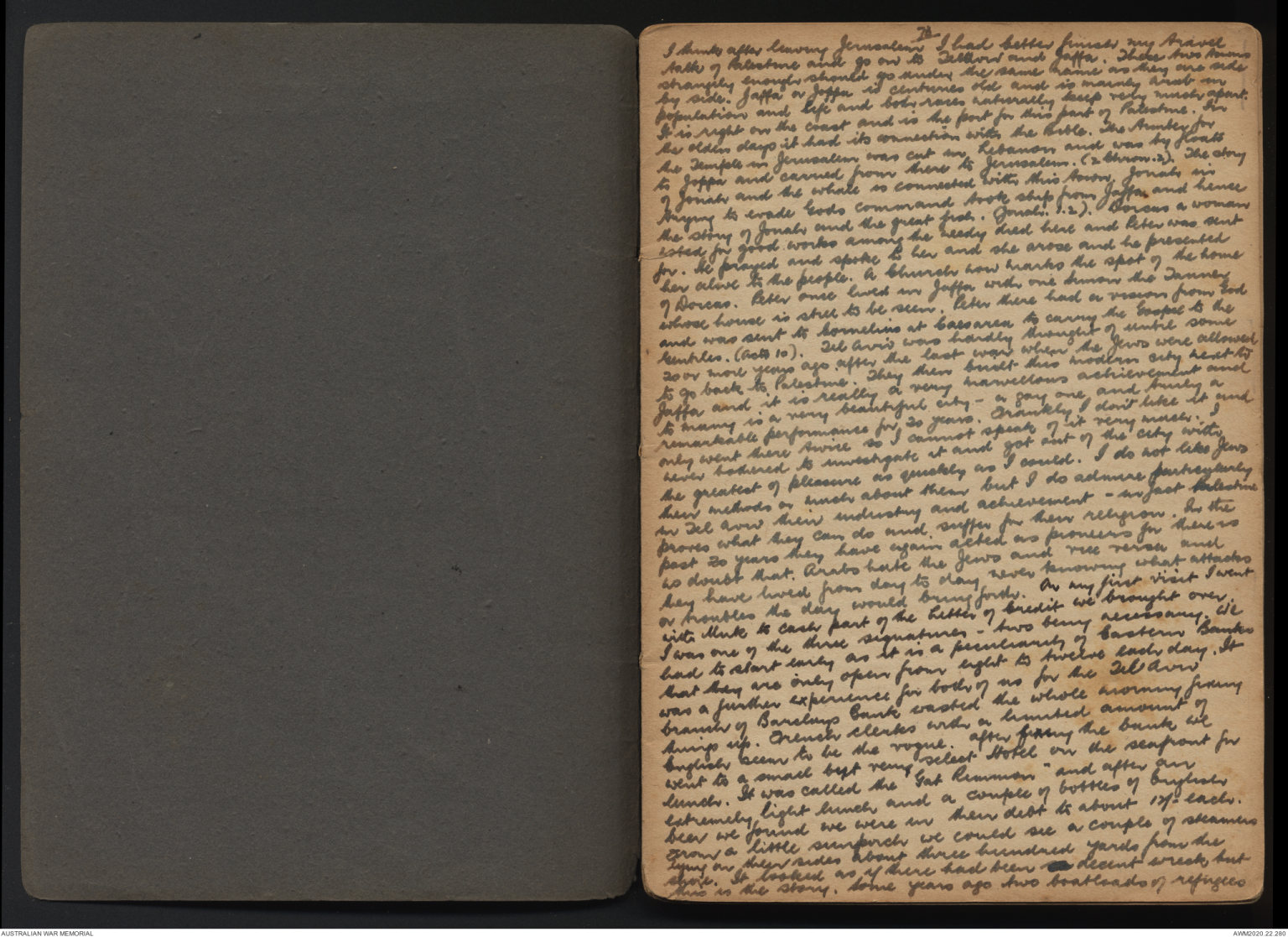
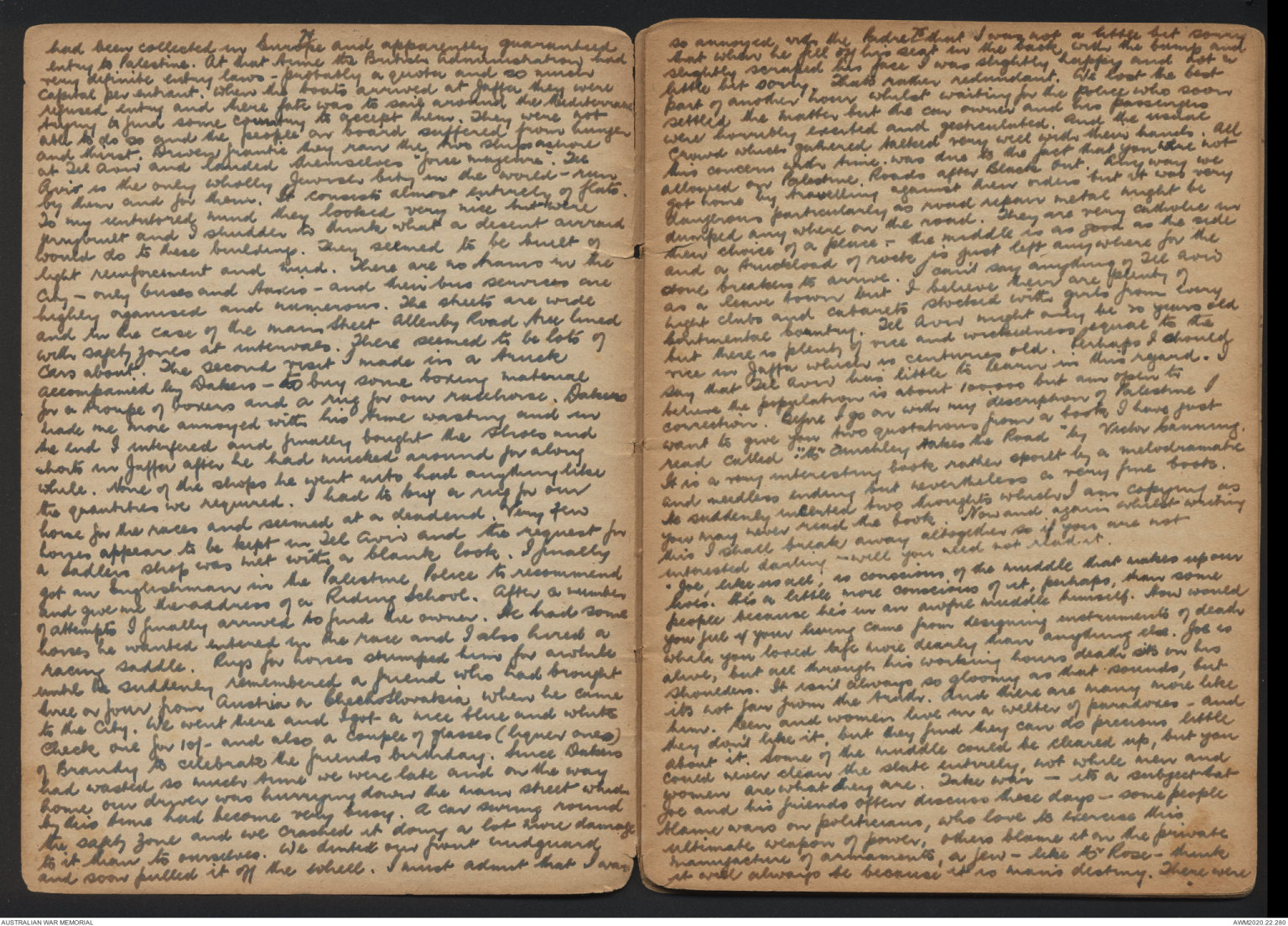
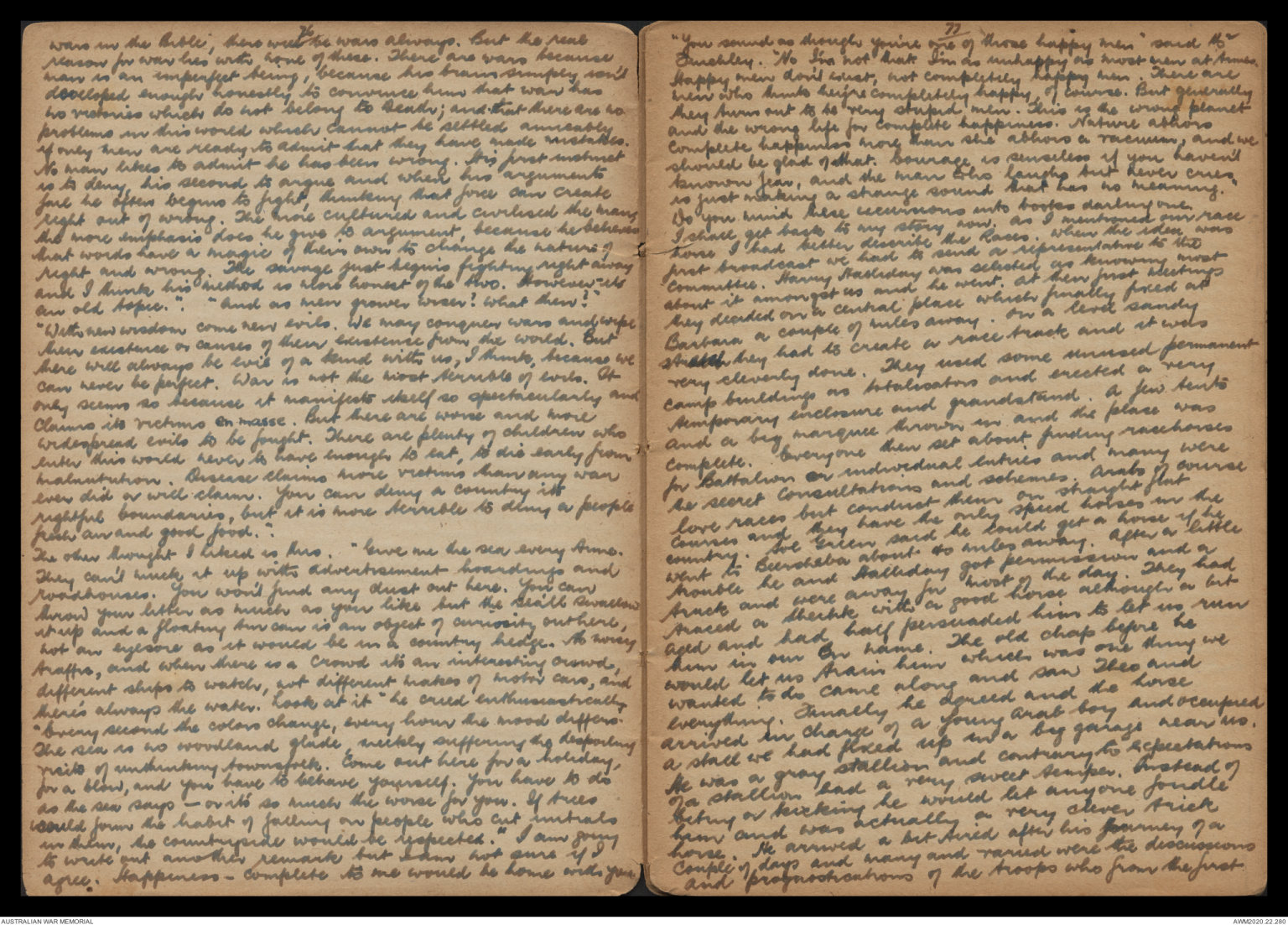
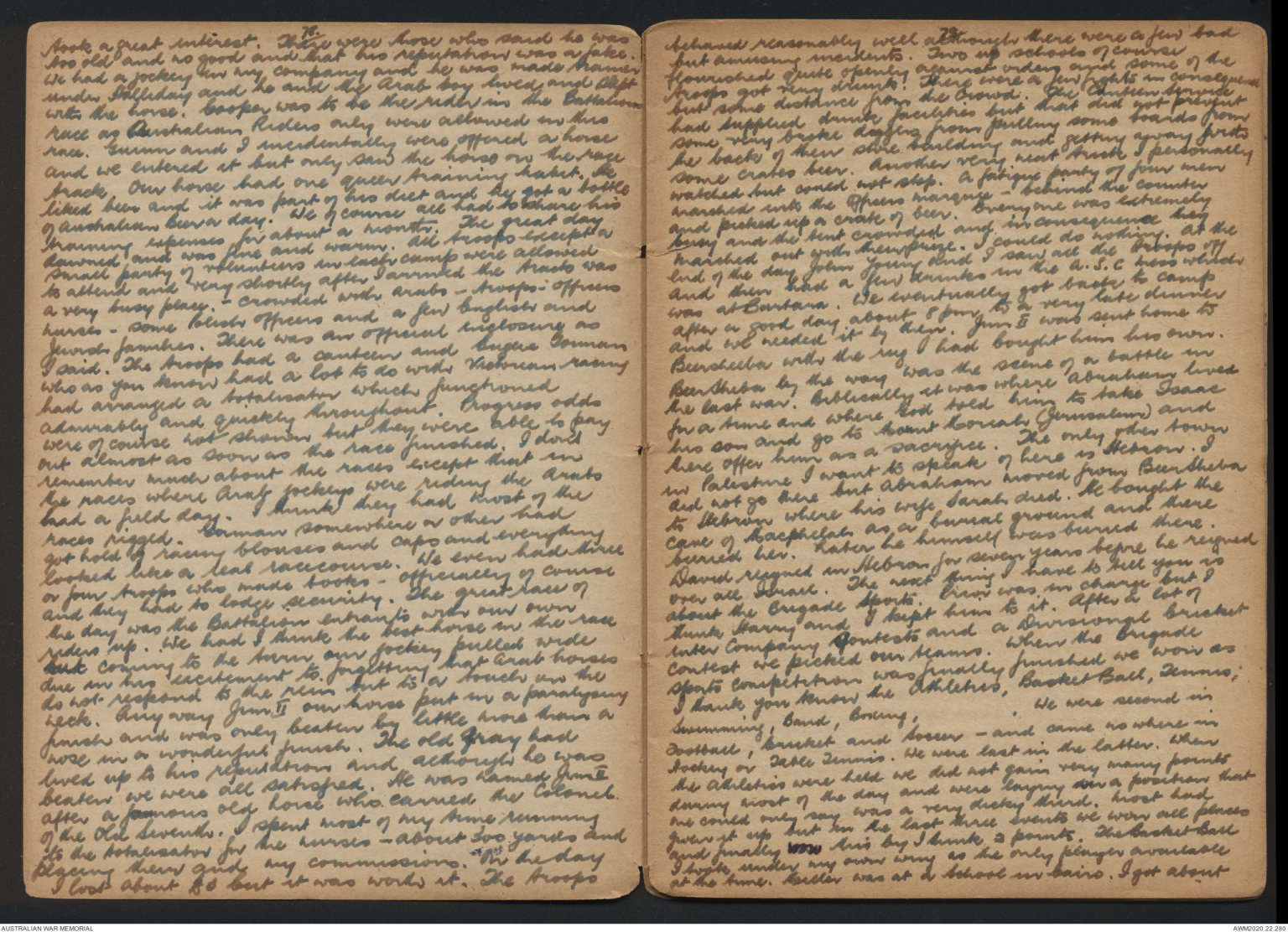
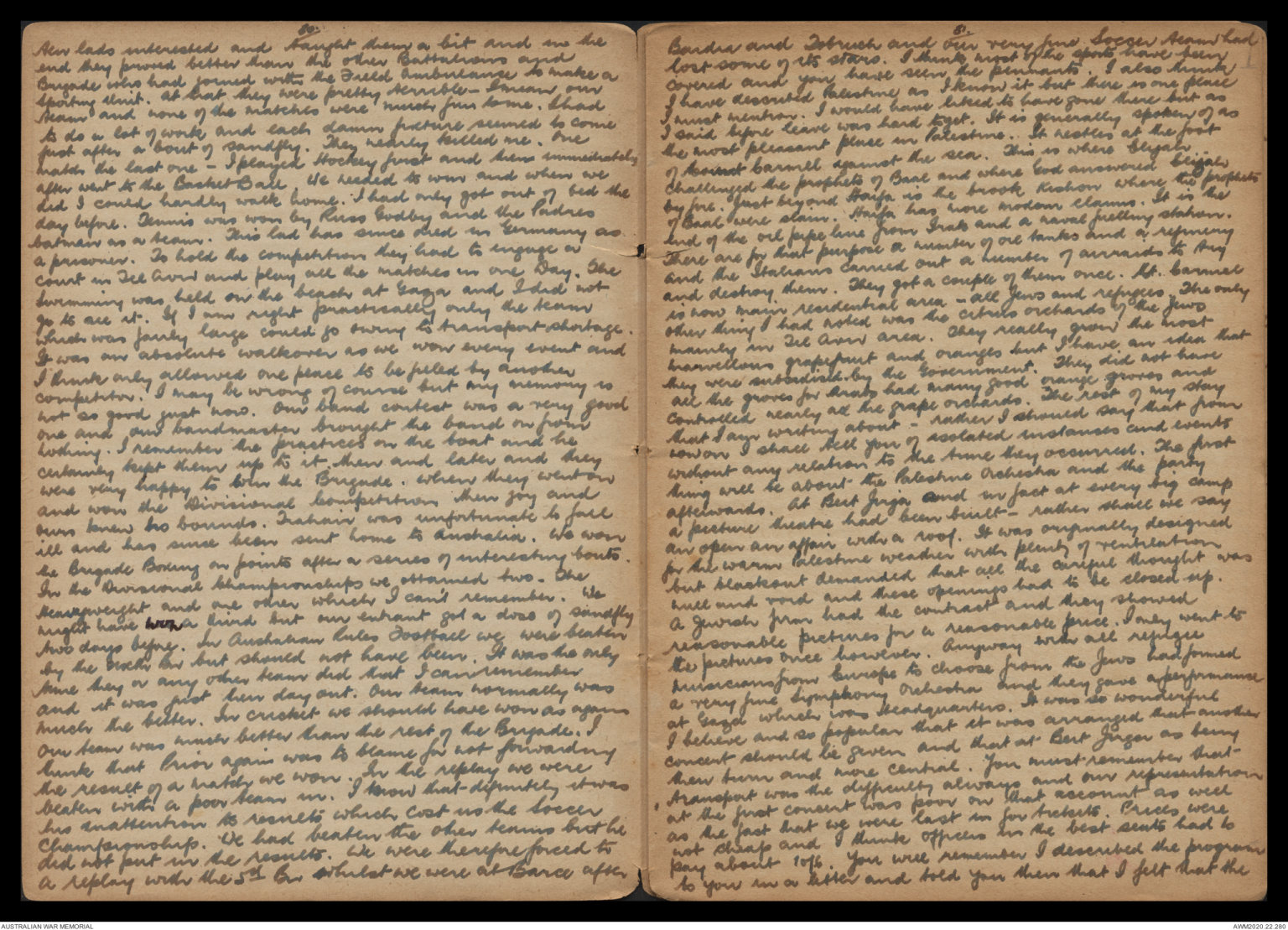
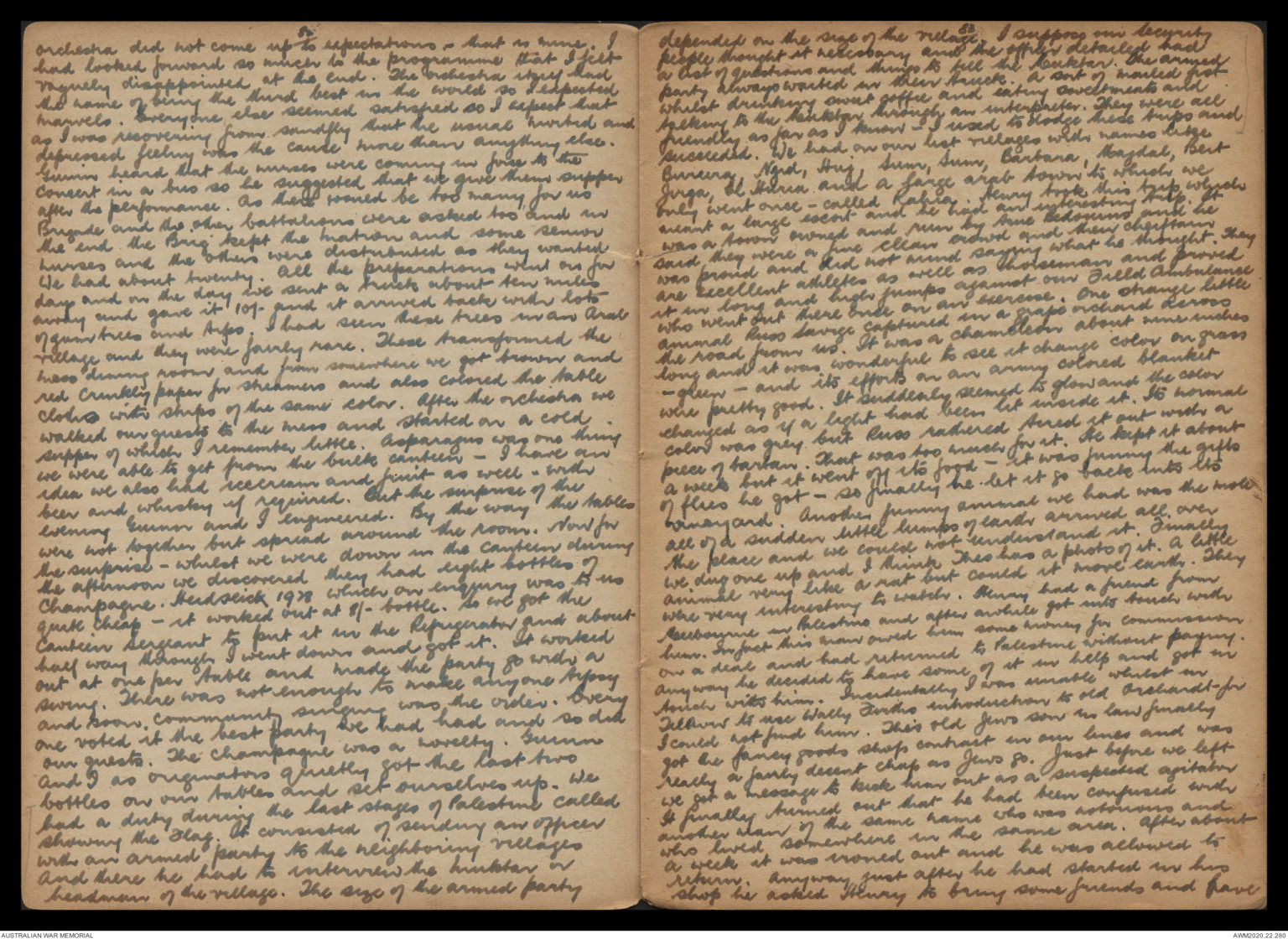
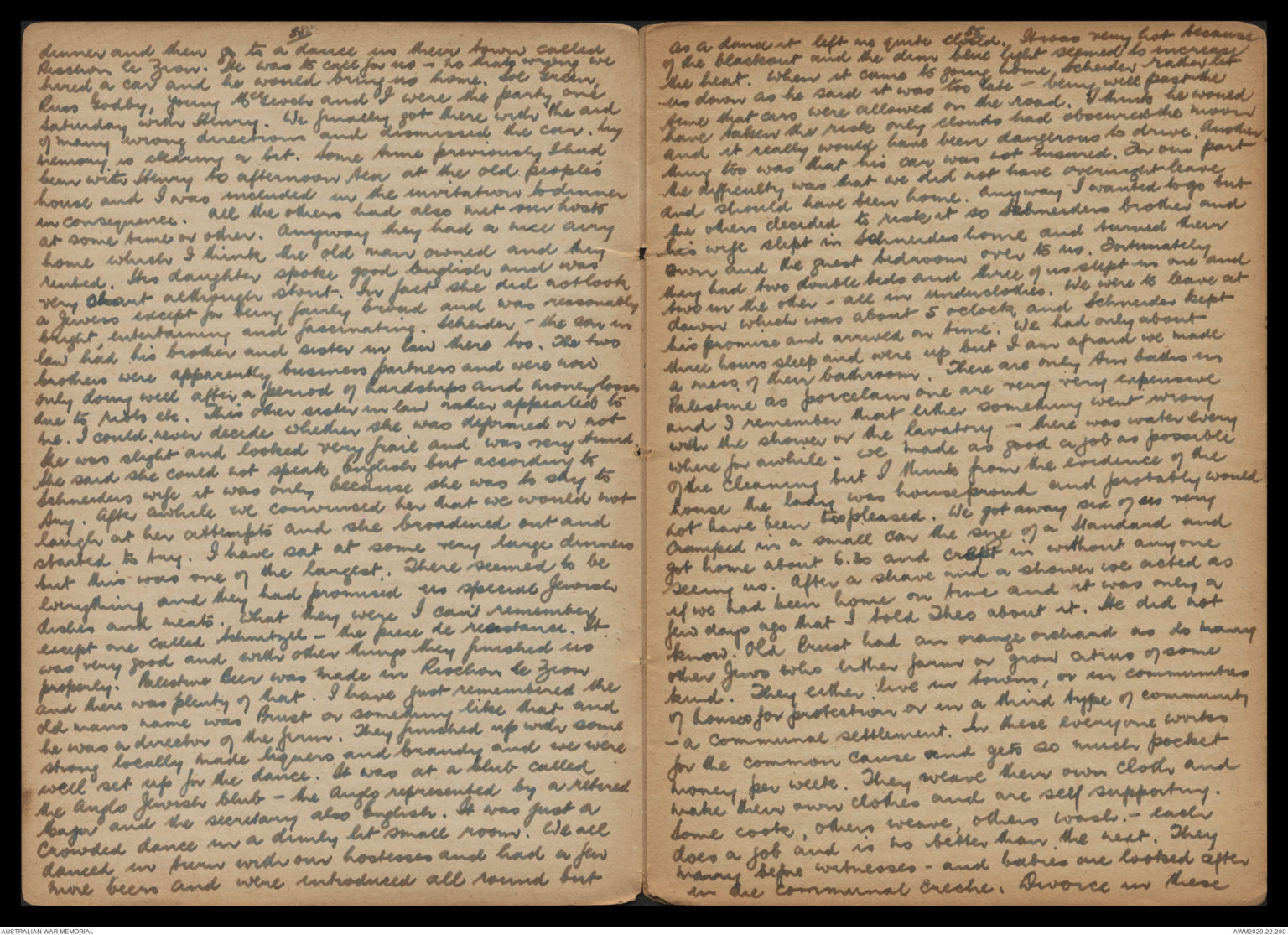
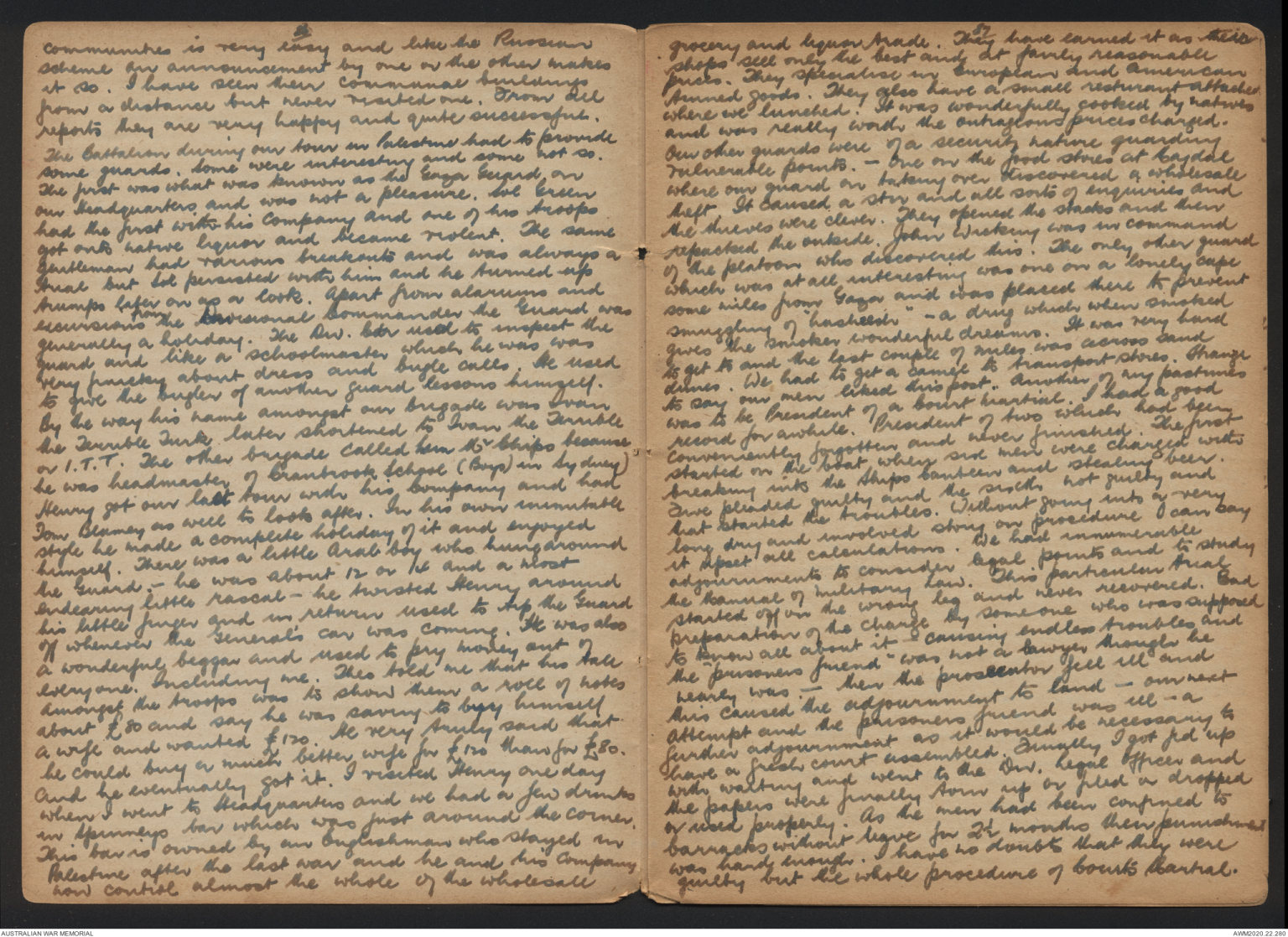
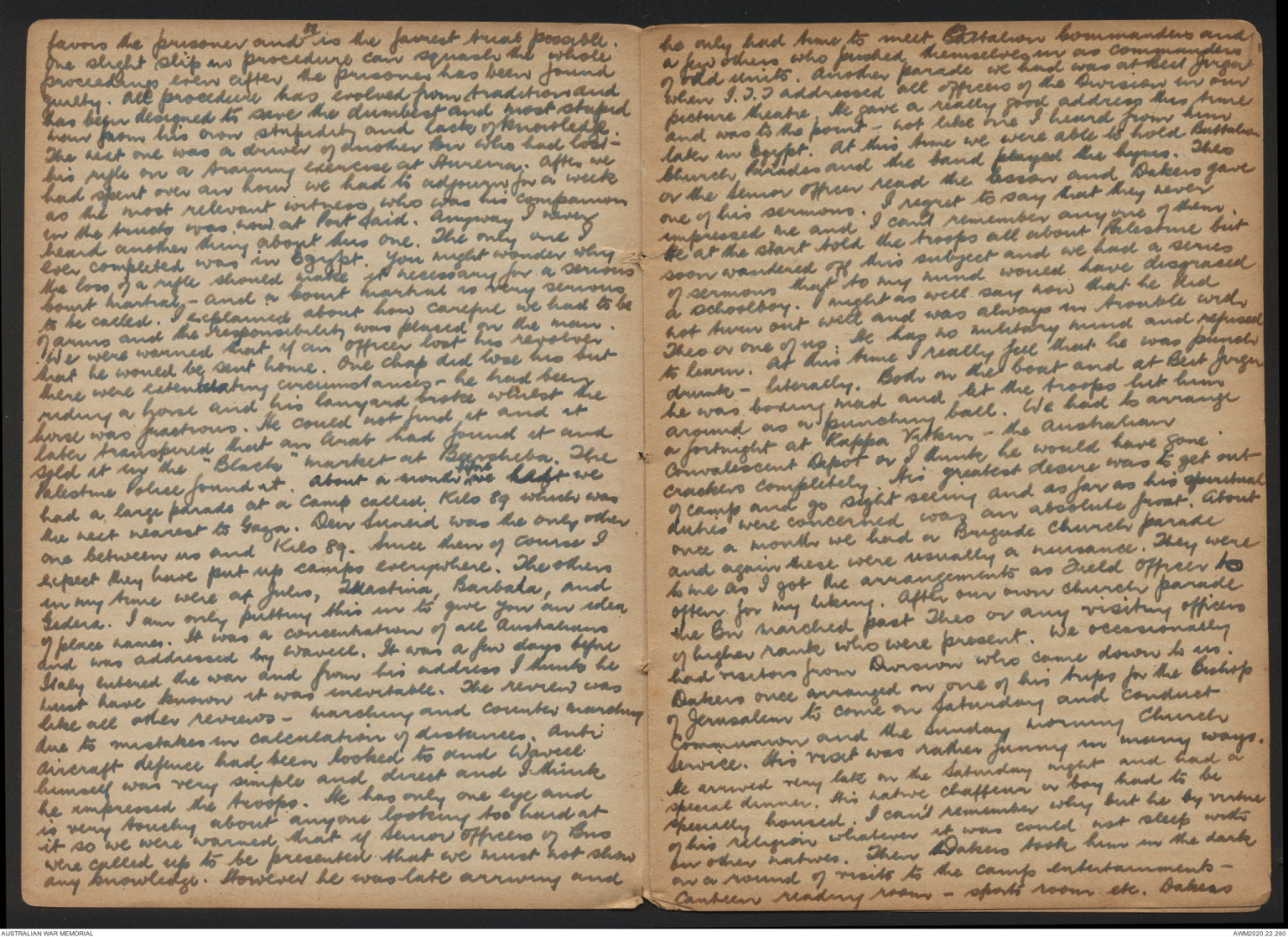
VX34 MAJOR H.C.D. MARSHALL
A.I.F.
3317.
III
Geprűft
2 9/6/43
Oflag IXA
Nr 4
73
I think after leaving Jerusalem I had better finish my travel
talk of Palestine and go to TelAviv and Jaffa. These two towns
strangely enough should go under the same name as they are side
by side. Jaffa or Joppa is centuries old and is mainly Arab in
population and life and both races naturally keep very much apart.
It is right on the coast and is the port for this part of Palestine. In
the olden days it had its connection with the Bible. The Amber for
the Temple in Jerusalem was cut in Lebanon and was by floats
to Joppa and carried from there to Jerusalem. (2 Chron.2). The story
of Jonah and the whale is connected with this town. Jonah in
trying to evade God's command took ship from Jaffa and hence
the story of Jonah and the great fish. (Jonah. 1.2). Dorcus a woman
noted for good works among the needy died here and Peter was sent
for. He prayed and spoke to her and she arose and he presented
her alive to the people. A Church now marks the spot of the home
of Dorcas. Peter once lived in Jaffa with one Simon the Tanner
whose house is still to be seen. Peter there had a vision from God
and was sent to Cornelius at Caesarea to carry the Gospel to the
Gentiles. (Acts 10). Tel Aviv was hardly thought of until some
20 or more years ago after the last war when the Jews were allowed
to go back to Palestine. They then built this modern city next to
Jaffa and it is really a very marvellous achievement and
to many is a very beautiful city - a gay one, and truly a
remarkable performance for 20 years. Frankly I don't like it and
only went there twice so I cannot speak of it very much. I
never bothered to investigate it and got out of the city with
the greatest of pleasure as quickly as I could. I do not like Jews
their methods or much about them but I do admire particularly
in Tel Aviv their industry and achievement - in fact Palestine
proves what they can do and suffer for their religion. In the
past 20 years they have again acted as pioneers for there is
no doubt that Arabs hate the Jews and vice versa and
they have lived from day to day never knowing what attacks
or troubles the day would bring forth. On my first visit I went
with Mick to cash part of the Letter of Credit we brought over.
I was one of the three signatures - two being necessary. We
had to start early as it is a peculiarity of Eastern Banks
that they are only open from eight to twelve each day. It
was a further experience for both of us for the Tel Aviv
branch of Barclays Bank wasted the whole morning fixing
things up. French clerks with a limited amount of
English seem to be the vogue. After leaving the Bank we
went to a small but very select Hotel on the seafront for
lunch. It was called the "Gat Rimmon" and after our
extremely light lunch and a couple of bottles of English
beer we found we were in their debt to about 12/- each.
From a little sunporch we could see a couple of steamers
lying on their sides about three hundred yards from the
shore. It looked as if there had been a decent wreck but
this is the story. Some years ago two boatloads of refugees
74
had been collected in Europe and apparently guaranteed
entry to Palestine. At that time the British Administration had
very definite entry laws - probably a quota and so much
capital per entrant. When the boats arrived at Jaffa they were
refused entry and there fate was to sail around the Mediterranean
trying to find some country to accept them. They were not
able to do so and the people on board suffered from hunger
and thirst. Driven frantic they ran the two ships ashore
at Tel Aviv and landed themselves "force majeure". Tel
Aviv is the only wholly Jewish City in the world - run
by them and for them. It consists almost entirely of flats.
To my untutored mind they looked very nice but were
jerrybuilt and I shudder to think what a decent airraid
would do to these buildings. They seemed to be built of
light reinforcement and mud. There are no trams in the
city - only buses and taxis - and their bus services are
highly organised and numerous. The streets are wide
and in the case of the main Street Allenby Road tree lined
with safety zones at intervals. There seemed to be lots of
cars about. The second visit I made in a truck
accompanied by Dakers - to buy some boxing material
for a troupe of boxers and rug for our racehorse. Dakers
made me more annoyed with his time wasting and in
the end I interfered and finally bought the shoes and
shorts in Jaffa after he had mucked around for a long
while. None of the shops he went into had anything like
the quantities we required. I had to buy a rug for our
horse for the races and seemed at a deadend. Very few
horses appear to be kept in Tel Aviv and the request for
a Sadlers shop was met with a blank look. I finally
got an Englishman in the Palestine Police to recommended
and give me the address of a Riding School. After a number
of attempts I finally arrived to find the owner. He had some
horses he wanted entered in the race and I also hired a
racing saddle. Rugs for horses stumped him for a while
until he suddenly remembered a friend who had brought
three or four from Austria or ChechoSlovakia when he came
to the City. We went there and I got a nice blue and white
check one for 10/- and also a couple of glasses (liquer ones)
of Brandy to celebrate the friends birthday. Since Dakers
had wasted so much time we were late and on the way
home our driver was hurrying down the main street which
by this time had become very busy. A car swung round
the safety zone and we crashed it doing a lot more damage
to it than to ourselves. We dented our front mudguard
and soon pulled it off the wheel. I must admit that I was
75
so annoyed with the Padre that I was not a little bit sorry
that when he fell off his seat in the back with the bump and
slightly scraped his face I was slightly happy and not a
little bit sorry. Thats rather redundant. We lost the best
part of another hour whilst waiting for the police who soon
settled the matter but the car owner and his passengers
were horribly excited and gesticulated and the usual
crowd which gathered talked very well with their hands. All
this concern with time. was due to the fact that you were not
allowed on Palestine Roads after Black Out. Any way we
got home by travelling against their orders but it was very
dangerous particularly as road repair metal might be
dumped any where on the road. They are very catholic in
their choice of a place - the middle is as good as the side
and a truckload of rock is just left any where for the
stone breakers to arrive. I can't say anything of Tel Aviv
as a leave town but I believe their are plenty of
night clubs and cabarets stocked with girls from every
Continental Country. Tel Aviv might only be 20 years old
but there is plenty of vice and wickedness equal to the
vice in Jaffa which is centuries old. Perhaps I should
say that Tel Aviv has little to learn in this regard. I
believe the population is about 100,000 but am open to
correction. Before I go on with my description of Palestine I
want to give you two quotations from a book I have just
read called "Mr Finchley takes the Road" by Victor Canning.
It is a very interesting book rather spoilt by a melodramatic
and needless ending but nevertheless a very fine book.
He suddenly inserted two thoughts which I am copying as
you may never read the book. Now and again whilst writing
this I shall break away altogether so if you are not
interested darling - well you need not read it.
"Joe, like us all, is conscious of the muddle that makes up our
lives. He's a little more conscious of it, perhaps, than some
people because he's in an awful muddle himself. How would
you feel if your living came from designing instruments of death
while you loved life more dearly than anything else. Joe is
alive, but all through his working hours death sits on his
shoulders. It isn't always so gloomy as that sounds, but
its not far from the truth. And there are many more like
him. Men and women live in a welter of paradoxes - and
they don't like it, but they find they can do precious little
about it. Some of the muddle could be cleared up, but you
could never clear the slate entirely, not while men and
women are what they are. Take war - its a subject that
Joe and his friends often discuss these days - some people
blame wars on politicians, who love to exercise this
ultimate weapon of power, others blame it on the private
manufacture of armaments, a few - like Mr Rose - think
it will always be because it is man's destiny. There were
76
wars in the Bible, there will be wars always. But the real
reason for war lies with some of these. There are wars because
man is an imperfect being, because his brain simply isn't
developed enough honestly to convince him that war has
no victories which do not belong to Death; and that there are no
problems in this world which cannot be settled amicably
if only men are ready to admit that they have made mistakes.
No man likes to admit he has been wrong. His first instinct
is to deny his second to argue and when his arguments
fail he often begins to fight, thinking that force can create
right out of wrong. The more cultured and civilised the man,
the more emphasis does he give to argument, because he believes
that words have a magic of their own to change the nature of
right and wrong. The savage just begins fighting right away
and I think his method is more honest of the two. However - its
an old topic." "And as men grower wiser? What then?"
"With new wisdom come new evils. We may conquer wars and wipe
their existence or courses of their existence from the world. But
there will always be evil of a kind with us, I think, because we
can never be perfect. War is not the most terrible of evils. It
only seems so because it manifests itself so spectacularly and
claims its victims en masse. But there are worse and more
widespread evils to be fought. There are plenty of children who
enter this world never to have enough to eat, to die early from
malnutrition. Disease claims more victims than any war
ever did or will claim. You can deny a country its
rightful boundaries, but it is more terrible to deny a people
fresh air and good food."
The other thought I like is this. "Give me the sea every time.
They can't muck it up with advertisement hoardings and
roadhouses. You won't find any dust out here. You can
throw your litter as much as you like but the sea'll swallow
it up and a floating tin can is an object of curiosity out here,
not an eyesore as it would be in a country hedge. No noisy
traffic, and when there is a crowd it's an interesting crowd,
different ships to watch, not different makes of motor cars, and
there's always the water. Look at it" he cried enthusiastically
"Every second the colors change, every hour the mood differs.
The sea is no woodland glade, meekly suffering the despoiling
visits of unthinking townsfolk. Come out here for a holiday,
for a blow, and you have to behave yourself. You have to do
as the sea says - or it's so much the worse for you. If trees
could form the habit of falling on people who cut initials
in them, the countryside would be respected." I am going
to write out another remark but I am not sure if I
agree. Happiness - complete to me would be home with you
77
"You sound as though you're one of those happy men" said Mr
Finchley. "No I'm not that I'm as unhappy as most men at times.
Happy men don't exist, not completely happy men. There are
men who think they're completely happy, of course. But generally
they turn out to be very stupid men. This is the wrong planet
and the wrong life for complete happiness. Nature abhors
complete happiness more than she abhors a vacuum, and we
should be glad of that. Courage is senseless if you haven't
known fear, and the man who laughs but never cries
is just making a strange sound that has no meaning.
Do you mind these incursions into books darling one.
I shall get back to my story now. As I mentioned our race
horse I had better describe the Races. When the idea was
first broadcast we had to send a representative to the
committee. Harry Halliday was selected as knowing most
about it amongst us and he went. At their first meetings
they decided on a central place which finally fixed at
Barbara a couple of miles away. On a level sandy
stretch they had to create a race track and it was
very cleverly done. They used some unused permanent
camp buildings as totalisators and erected a very
temporary enclosure and grandstand. A few tents
and a big marquee thrown in and the place was
complete. Everyone then set about finding racehorses
for Battalion or individual entries and many were
the secret consultations and schemes. Arabs of course
love races but conduct them on straight flat
courses and they have the only speed horses in the
country. Sol Green said he could get a horse if he
went to Beersheba about 40 miles away. After a little
trouble he and Halliday got permission and a
truck and were away for most of the day. They had
traced a Sheihk with a good horse although a bit
aged and had half persuaded him to let us run
him in our Bn name. The old chap before he
would let us train him which was one thing we
wanted to do came along and saw Theo and
everything. Finally he agreed and the horse
arrived in charge of a young Arab boy and occupied
a stall we had fixed up in a big garage near us.
He was a gray stallion and contrary to expectations
of a stallion had a very sweet temper. Instead of
biting or kicking he would let anyone fondle
him and was actually a very clever trick
horse. He arrived a bit tired after his journey of a
couple of days and many and varied were the discussions
and prognostications of the troops who from the first
78.
took a great interest. There were those who said he was
too old and no good and that his reputation was a joke.
We had a jockey in my company and he was made trainer
under Halliday and he and the Arab boy lived and slept
with the horse. Cooper was to be the rider in the Battalion
race as Australian Riders only were allowed in this
race. Guinn and I incidentally were offered a horse
and we entered it but only saw the horse on the race
track. Our horse had one queer training habit. He
liked beer and it was part of his diet and he got a bottle
of Australian Beer a day. We of course all had to share his
training expenses for about a month. The great day
dawned and was fine and warm. All troops except a
small party of volunteers in each camp were allowed
to attend and very shortly after I arrived the track was
a very busy place. - crowded with Arabs - troops - officers
nurses - some Polish officers and a few English and
Jewish families. There was an official enclosure as
I said. The troops had a canteen and Eugene Gorman
who as you know had a lot to do with Victorian racing
had arranged a totalisator which functioned
admirably and quickly throughout. Progress odds
were of course not shown but they were able to pay
out almost as soon as the race finished. I don't
remember much about the races except that in
the races where Arab jockeys were riding the Arabs
had a field day. I think they had most of the
races rigged. Gorman somewhere or other had
got hold of racing blouses and caps and everything
looked like a real racecourse. We even had three
or four troops who made books - officially of course
and they had to lodge security. The great race of
the day was the Battalion entrants with our own
riders up We had I think the best horse in the race
but coming to the turn our jockey pulled wide
due in his excitement to forgetting that Arab horses
do not respond to the rein but to a touch on the
neck. Any way Jim II our horse put in a paralysing
push and was only beaten by little more than a
nose in a wonderful finish. The old Gray had
lived up to his reputation and although he was
beaten we were all satisfied. He was named Jim II
after a famous old horse who carried the Colonel
of the Old Seventh. I spent most of my time running
to the totalisator for the nurses - about 300 yards and
placing their and my commissions. On the day
I lost about £3 but it was worth it. The troops
79
behaved reasonably well although there were a few bad
but amusing incidents. Two up schools of course
flourished quite openly against orders and some of the
troops got very drunk! There were a few fights in consequence
but some distance from the crowd. The Canteen Service
had supplied drink facilities but that did not prevent
some very broke diggers from pulling some boards from
the back of their store building and getting away with
some crates beer. Another very neat trick I personally
watched but could not stop. A fatigue party of four men
marched into the Officers Marquee - behind the counter
and picked up a crate of beer. Every one was extremely
busy and the tent crowded and in consequence they
marched out with their prize. I could no nothing. At the
end of the day John Young and I saw all the troops off
and then had a few drinks in the A.S.C. Mess which
was at Barbara. We eventually got back to camp
after a good day about 8 pm to a very late dinner
and we needed it by the. Jim II was sent home to
Beersheeba with the rug I had bought him his own.
BeerSheba by the way was the scene of a battle in
the last war. Biblically it was where Abraham lived
for a time and where God told him to take Isaac
his son and go to Mount Moriah (Jerusalem) and
here offer him as a sacrifice. The only other town
in Palestine I want to speak of here is Hebron. I
did not go there but Abraham moved from BeerSheba
to Hebron where his wife Sarah died. He bought the
cave of Macphelah as a burial ground and there
buried her. Later he himself was buried there.
David reigned in Hebron for seven years before he reigned
over all Israel. The next thing I have to tell you is
about the Brigade Sports. Prior was in charge but I
think Harry and I kept him to it. After a lot of
inter Company Contests and a Divisional Cricket
Contest we picked our teams. When the Brigade
sports competition was finally finished we won as
I think you know the Athletics, Basket Ball, Tennis,
Swimming, Band, Boxing. We were second in
Football, Cricket and Soccer - and came no where in
Hockey or Table Tennis. We were last in the latter. When
the Athletics were held we did not gain very many points
during most of the day and were laying in a position that
one could only say was a very dicky third. Most had
given up but in the last three events we won all places
and finally won this by I think 2 points. The Basket Ball
I took under my own wing as the only player available
at the time. Miller was at a School in Cairo. I got about
80
ten lads interested and taught them a bit and in the
end they proved better than the other Battalions and
Brigade who had joined with the Field Ambulance to make a
Sporting Unit. At that they were pretty terrible - I mean our
team and none of the matches were much fun to me. I had
to do a lot of work and each damn fixture seemed to come
just after a bout of sandfly. They nearly killed me. One
match the last one - I [played Hockey first and then immediately
after went to the Basket ball. We needed to win and when we
did I could hardly walk home. I had only got out of bed the
day before. Tennis was won by Russ Godby and the Padres
batman as a team This lad has since died in Germany as
a prisoner. To hold the competitions they had to engage a
court in Tel Aviv and play all the matches in one Day. The
swimming was held on the beach at Gaza and I did not
go to see it. If I am right practically only the team
which was fairly large could go owing to a transport shortage.
It was an absolute walkover as we won every event and
I think only allowed one place to be filled by another
competitor. I maybe wrong of course but my memory is
not as good just now. our band contest was a very good
one and our bandmaster brought the band on from
nothing. I remember the practices on the boat and he
certainly kept them up to it then and later and they
were very happy to win the Brigade. When they went on
and won the Divisional Competition then joy and
own knew no bounds. Trahain was unfortunate to fall
ill and has since been sent home to Australia. We won
the Brigade Boxing on points after a series of interesting bouts.
In the Divisional Championships we attained two - The
Heavyweight and one other which I cant remember. We
might have won a third but our entrant got a dose of sandfly
two days before. in Australian Rules Football we were beaten
by the sixth Bn but should not have been. It was the only
time they or any other team did that I can remember
and it was just their day out. Our team normally was
much the better. In cricket we should have won as again
our team was much better than the rest of the Brigade. I
think that Prior again was to blame for not forwarding
the result of a match we won. In the replay we were
beaten with a poor team in. I know that - definitely it was
his inattention to results which cost us the Soccer
Championship. We had beaten the other teams but he
did not put in the results. We were therefore forced to
a replay with 5th Bn whilst we were at Barce after
81.
Bardia and Tobruck and our very fine Soccer team had
lost some of its stars. I think most of the sports have been
covered and you have seen the pennants. I also think
I have described Palestine as I know it but there is one place
I must mention. I would have liked to have gone there but as
I said before Leave was hard to get. It is generally spoken of as
the most pleasant place in Palestine. It nestles at the foot
of Mount Carmel against the sea. This is where Elijah
challenged the prophets of Baal and where God answered Elijah
by fire. Just beyond Haifa is the brook Kishon where the prophets
of Baal were slain. Haifa has more modern claims. It is the
end of the oil pipeline from Iran and a naval fuelling station.
There are for that purpose a number of oil tanks and a refinery
and the Italians carried out a number of airraids to any
and destroy them. They got a couple of them once. Mt. Carmel
is now main residential area - all Jews and refugees. The only
other thing I had noted was the citrus orchards of the Jews
mainly in Tel Aviv area. They really grow the most
marvellous grapefruit and oranges but I have an idea that
they are subsidised by the Government. they did not have
all the groves for Arabs had many good orange groves and
controlled nearly all the grape orchards. the rest of my stay
that I am writing about - rather I should say that from
now on I shall tell you of isolated instances and events
without any relation to the time they occurred. The first
thing will be about the Palestine Orchestra and the party
afterwards. At Beit Jirja and in fact at every big camp
a picture theatre had been built - rather shall we say
an open air affair with a roof. It was originally designed
for the warm Palestine weather with plenty of ventilation
but blackout demanded that all the careful thought was
null and void and these openings had to be closed up.
A Jewish firm had the contract and they showed
reasonable pictures for a reasonable price. I only went to
the pictures once however. Anyway with all refugee
musicians from Europe to choose from the Jews had formed
a very fine Symphony Orchestra and they gave a performance
at Gaza which was Headquarters. It was so wonderful
I believe and so popular that it was arranged that another
concert should be given and that at Beit Jirja as being
their turn and more central. You must remember that
transport was a difficulty always and our representation
at the first concert was poor on that account as well
as the fact that we were last in the tickets. Prices were
not cheap and I think officers in the best seats had to
pay about 10/6. You will remember I described the program
to you in a letter and told you then that I felt that the
82
orchestra did not come up to expectations - that is mine. I
had looked forward so much to the programme that I felt
vaguely disappointed at the end. The orchestra itself had
the name of being the third best in the world so I expected
marvels. Everyone else seemed satisfied so I expect that
as I was recovering from sandfly that the usual morbid and
depressed feeling was the cause more than anything else.
Guinn heard that the nurses were coming in force to the
concert in a bus so he suggested that we give them supper
after the performance. As there would be too many for us
Brigade and the other battalions were asked too and in
the end the Brig kept the matron and some senior
nurses and the others were distributed as they wanted.
We had about twenty. All the preparations went on for
days and on the day we sent a truck about ten miles
away and gave it 10/- and it arrived back with lots
of gum trees and tips. I had seen these trees in an Arab
village and they were fairly rare. These transformed the
mess dining room and from somewhere we got brown and
red crinkly paper for streamers and also colored the table
cloths with strips of the same color. After the orchestra we
walked our guests to the mess and started on a cold
supper of which I remember little. Asparagus was one thing
we were able to get from the bulk canteen - I have an
idea we also had icecream and fruit as well - with
beer and whisky if required. But the surprise of the
evening Guinn and I engineered. By the way the tables
were not together but spread around the room. Now for
the surprise - whilst we were down in the canteen during
the afternoon we discovered they had eight bottles of
Champagne. Heidseick 1928 which on enquiry was to us
quite cheap - it worked out at 8/- bottle. So we got the
Canteen Sergeant to put it in the Refrigerator and about
half way through I went down and got it. It worked
out at one per table and made the party go with a
swing. There was not enough to make anyone tipsy
and soon community singing was the order. Every
one voted it the best party we had had and so did
our guests . The Champagne was a novelty. Guinn
and I as originators quietly got the last two
bottles on our tables and set ourselves up. We
had a duty during the last stages of Palestine called
Showing the Flag. It consisted of sending an Officer
with an armed party to the neighboring villages
and there he had to interview the Muktar or
headman of the village. the size of the armed party
83
depended on the size of the village. I suppose our Security
people thought it necessary and the officer detailed had
a list of quotations and things to tell the Muktar. The armed
party always waited in their truck. A sort of mailed fist
whilst drinking sweet coffee and eating sweetmeats and
talking to the Muktar through an interpreter. They were all
friendly as far as I know - I used to dodge these trips and
succeeded. We had on our list villages with names like
Bureira, Ngid, Huj, Sum, Sunn, Barbara, Majdal, Beit
Jurja, Al Hurea, and a large arab town to which we
only went once - called Rahia. Henry took this trip which
meant a large escort and he had an interesting trip. It
was a town owned and run Arab Bedouins and he
said they were a fine clean crowd and their cheiftain
was proud and did not mind saying what he thought. They
are excellent athletes as well as horsemen and proved
it in long and high jumps against our Field Ambulance
who went out there once on an exercise. one strange little
animal Russ Savige captured in a grape orchard across
the road from us. It was a chameleon about nine inches
long and it was wonderful to see it change color on grass
- green - and its efforts on an army colored blanket
were pretty good. It suddenly seemed to glow and the color
changed as if a light had been lit inside it. He kept it about
a week but it went off its food - it was funny the gifts
of flies he got - so finally he let it go back into its
vineyard. Another funny animal we had was the mole.
All of a sudden little lumps of earth arrived all over
the place and we could not understand it. Finally
we dug one up and I think Theo has a photo of it. A little
animal very like a rat but could it move earth. They
were very interesting to watch. Henry had a friend from
Melbourne in Palestine and after awhile got in touch with
him. In fact this man owed him some money for commission
on a deal and had returned to Palestine without paying.
Anyway he decided to have some of it in help and got in
touch with him. Incidentally I was unable whilst in
Tel Aviv to use Wally Firths introduction to old Orchardt- for
I could not find him. This old Jews son in law finally
got the fancy goods shop contract in our lines and was
really a fairly decent chap as Jews go. Just before we left
we got a message to kick him out as a suspected agitator
It finally turned out that he had been confused with
another man of the same name who was notorious and
who lived somewhere in the same area. After about
a week it was ironed out and he was allowed to
return. Anyway just after he had started in his
shop he asked Henry to bring some friends and have
84
dinner and then go to a dance in their town called
Risshon le Zion. He was to call for us - no thats wrong we
hired a car and he would bring us home. Sol Green,
Russ Godby, young McGeuch and I were the party one
Saturday with Henry. We finally got there with the aid
of many wrong directions and dismissed the car. My
memory is clearing a bit. Some time previously I had
been with Henry to afternoon tea at the old people's
house and I was included in the invitation to dinner
in consequence. All the others had also met our hosts
at some time or other. Anyway they had a nice airy
home which I think the old man owned and they
rented. His daughter spoke good English and was
very short although stout. In fact did not look
a Jewess except for being fairly broad and was reasonably
bright, entertaining and fascinating. Schneider - the son in
law had his brother and sister in law there too. The two
brothers were apparently business partners and were now
only doing well after a period of hardships and money losses
due to riots etc. This other sister in law rather appealed to
me. I could never decide whether she was deformed or not
She was slight and looked very frail and was very timid.
She said she could not speak English but according to
Schneiders wife it was only because she was to shy to
try. After awhile we convinced her that we would not
laugh at her attempts and she broadened out and
started to try. I have sat at some very large dinners
but this was one of the largest. there seemed to be
everything and they had promised us special Jewish
dishes and meats. What they were I cant remember
except one called Schnitzel - the piece de resistance. It
was very good and with other things they finished us
properly. Palestine Beer was made in Rischon Le Zion
and there was plenty of that. I have just remembered the
old mans name was Pruet or something like that and
he was a director of the firm. They finished up with some
strong locally made liquers and brandy and we were
well set up for the dance. it was at a Club called
the Anglo Jewish Club - the Anglo represented by a retired
Major and the secretary also English. It was just a
crowded dance in a dimly lit small room. We all
danced in turn with our hostesses and had a few
more beers and were introduced all round but
85
as a dance it left me quite closed. It was very hot because
of the blackout and the dim blue light seemed to increase
the heat. When it comes to going home Scherder rather let
us down as he said it was too late - being well past the
time that cars were allowed on the road. I think he would
have taken the risk only clouds had obscured the moon
and it really would have been dangerous to drive. Another
thing too was that his car was not insured. For our part
the difficulty was that we did not have overnight leave
and should have been home. Anyway I wanted to go but
the others decided to risk it so Scheiders brother and
his wife slept in Scherders home and turned their
own and the guest bedroom over to us. Fortunately
they had two double beds and three of us slept in one and
two in the other - all in underclothes. We were to leave at
dawn which was about 5 oclock and Schneider kept
his promise and arrived on time. We had only about
three hours sleep and were up but I am afraid we made
a mess of their bathroom. There are only tin baths in
Palestine as porcelain one are very very expensive
and I remember that either something went wrong
with the shower or the lavatory - there was water every
where for awhile - we made as good a job as possible
of the cleaning but I think from the evidence of the
house the lady was houseproud and probably would
not have been too pleased. We got away six of us very
cramped in a small car the size of a Standard and
got home about 6.30 and crept in without any one
seeing us. After a shave and a shower we acted as
if we had been home on time and it was only a
few days ago that I told Theo about it. He did not
know. Old Priest had an orange orchard as do many
other Jews who either farm or grow citrus of some
kind. They either live in towns, or in communities
of houses for protection or in a third type of community
- a communal settlement. In these everyone works
for the common cause and gets so much pocket
money per week. They weave their own cloth and
make their own clothes and are self supporting.
Some cook, others weave, others wash. - each
does a job and is no better than the next. They
marry before witnesses - and babies are looked after
in the communal creche. Divorce in these
86
communities is very easy and like the Russian
scheme and announcement by one or the other makes
it so. I have seen their communal buildings
from a distance but never visited one. From all
reports they are very happy and quite successful.
The Battalion during our tour in Palestine had to provide
some guards. Some were interesting and some not so.
The first was what was known as the Gaza Guard on
our Headquarters and was not a pleasure. Sol Green
had the first with his company and one of his troops
got onto native liquor and became violent. The same
gentleman had various breakouts and was always a
trial but Sol persisted with him and he turned up
trumps later on as a cook. Apart from alarums and
excursions from the Divisional Commander the Guard was
generally a holiday. the Div. Cdr used to inspect the
guard and like a schoolmaster which he was was
very finicky about dress and bugle calls. He used
to give the bugler of another guard lessons himself.
By the way his name amongst our Brigade was Ivan
the Terrible Turk later shortened to Ivan the Terrible
or I.T.T. The other brigade called him Mr Chips because
he was headmaster of Cranbrook School (Boys) in Sydney)
Henry got our last tour with his Company and had
Tom Blamey as well to look after. In his own inimitable
style he made a complete holiday of it and enjoyed
himself. there was a little Arab boy who hung around
the Guard - he was about 12 or 14 and a most
endearing little rascal - he twisted Henry around
his little finger and in return used to tip the Guard
off whenever the Generals car was coming. He was also
a wonderful beggar and used to pry money out of
everyone. Including me. Theo told me that his tale
amongst the troops was to show them a roll of notes
about £80 and say he was saving to buy himself
a wife and wanted £120. He very truly said that
he could buy a much better wife for £120 than for £80.
And he eventually got it. I visited Henry one day
when I went to Headquarters and we had a few drinks
in Spinneys bar which was just around the corner.
This bar is owned by an Englishman who stayed in
Palestine after the last war and he and his company
now control almost the whole of the wholesale
87
grocery and liquor trade. They have earned it as their
shops sell only the best and at fairly reasonable
prices. They specialise in European and American
tinned goods. They also have a small restaurant attached
where we lunched. I was wonderfully cooked by natives
and was really worth the outrageous prices charged.
Our other guards were of a security nature guarding
vulnerable points. - on on the food stores at Majdal
where our guard on taking over discovered a wholesale
theft. It caused a stir and all sorts of enquiries and
the thieves were clever. They opened the stacks and then
repacked the outside. John Wickery was in command
of the platoon who discovered this. The only other guard
which was at all interesting was one on a lonely cape
some miles from Gaza and was placed there to prevent
smuggling of "hasheesh" - a drug which when smoked
gives the smoker wonderful dreams. It was very hard
to get to and the last couple of miles was across sand
dunes. We had to get a camel to transport stores. Strange
to say our men liked this post. Another of my pastimes
was to be President of the Court Martial. I had a good
record for awhile. president of two which had been
conveniently forgotten and never finished. the first
started on the boat when six men were charged with
breaking into the ships Canteen and stealing beer.
Five pleaded guilty and the sixth not guilty and
that started the troubles. Without going into a very
long dry and involved story on procedure I can say
it upset all calculations. We had innumerable
adjournments to consider legal points and to study
the Manual of Military Law. This particular trial
started off on the wrong leg and never recovered. Bad
preparation of the charge by someone who was supposed
to know all about it - causing endless troubles and
the 'prisoners friend' was not a lawyer though he
nearly was - then the prosecution fell ill and
this caused the adjournment to land - our next
attempt and the prisoners friend was ill - a
further adjournment as it would be necessary to
have a fresh court assembled. Finally I got fed up
with waiting and went to the Div. Legal Officer and
the papers were finally turn up or filed or dropped
or used properly. As the men had been confined to
barracks without leave for 2½ months their punishment
was hard enough. I have no doubts that they were
guilty but the whole procedure of Courts Martial
88
favors the prisoner and is the fairest trial possible.
One slight slip in procedure can squash the whole
proceedings even after the prisoner has been found
guilty. All procedure has evolved from traditions and
has been designed to save the dumbest and most stupid
man from his own stupidity and lack of knowledge.
The next one was a driver of another man who had lost
his rifle on a training exercise at [[Sturema?]]. After we
had spent over an hour we had to adjourn for a week
as the most relevant witness who was his companion
in the truck was now at Port Said. Anyway I never
heard another thing about this one. The only one I
ever completed was in Egypt. You might wonder why
the loss of a rifle should make it necessary for a serious
Court Martial - and a Court Martial is very serious
to be called. I explained about how careful we had to be
of arms and the responsibility was placed on the man.
We were warned that if an officer lost his revolver
that he would be sent home. One chap did lose his but
there were extenuating circumstances - he had been
riding a horse and his lanyard broke whilst the
horse was fractious. He could not find it and it
later transpired that an Arab had found it and
sold it in the "Black" market at Beersheba. the
Palestine Police found it. About a month ∧ before we left we
had a large parade at a camp called Kilo 89 which was
the next nearest to Gaza. Deir Suneid was the only other
one between us and Kilo 89. Since then of course I
expect they have put up camps everywhere. The others
in my time were at Julis, [[Thastina?]], Barbara, and
Gedera. I am only putting this in to give you an idea
of place names. It was a concentration of all Australians
and was addressed by Wavell. It was a few days before
Italy entered the war and from his address I think he
must have known it was inevitable. The review was
like all other reviews - marching and counter marching
due to mistakes in calculation of distances. Anti
Aircraft defence had been looked to and Wavell
himself was very simple and direct and I think
he impressed the troops. He has only one eye and
is very touchy about anyone looking too hard at
it so we were warned that if Senior officers of Bns
were called up to be presented that we must not show
any knowledge. However he was late arriving and
89
he only had time to meet Battalion Commanders and
a few others who pushed themselves in as Commanders
of odd units. Another parade we had was at [[Beit Jirga]]
when I.T.T. addressed all officers of the Division in our
picture theatre. He gave a really good address this time
and was to the point - not like one I heard from him
later in Egypt. At this time we were able to hold Battalion
Church Parades and the band played the hymns. Theo
or the Senior Officer read the lesson and Dakers gave
one of his sermons. I regret to say that they never
impressed me and I cant remember any one of them.
He at the start told the troops all about Palestine but
soon wandered off this subject and we had a series
of sermons that to my mind would have disgraced
a schoolboy. I might as well say now that he did
not turn out well and was always in trouble with
Theo or one of us. He has no military mind and refused
to learn. At this time I really feel that he was punch
drunk - literally. Both on the boat and at [[Beit Jirja?]]
he was boxing mad and let the troops hit him
around as a punching ball. We had to arrange
a fortnight at Kappa Vitkin - the Australian
Convalescent Depot or I think he would have gone
crackers completely. His greatest desire was to get out
of camp and go sight seeing and as far as his spiritual
duties were concerned was an absolute front. About
once a month we had a Brigade Church parade
and again these were usually a nuisance. They were
to me as I got the arrangements as Field Officer to
often for my liking. After our own church parade
the Bn marched past Theo or any visiting officers
of higher rank who were present. We occasionally
had visitors from Division who came down to us.
Dakers once arranged on one of his trips for the Bishop
of Jerusalem to come on Saturday and conduct
Communion and the Sunday morning Church
Service. His visit was rather funny in many ways.
He arrived very late on the Saturday night and had a
special dinner. His native chaffeur or boy had to be
specially housed. I can't remember why but he by virtue
of his religion whatever it was could not sleep with
our other natives. The Dakers took him in the dark
on a round of visits to the camp entertainments -
canteen reading room - sports room etc. Dakers
 Allen White
Allen WhiteThis transcription item is now locked to you for editing. To release the lock either Save your changes or Cancel.
This lock will be automatically released after 60 minutes of inactivity.